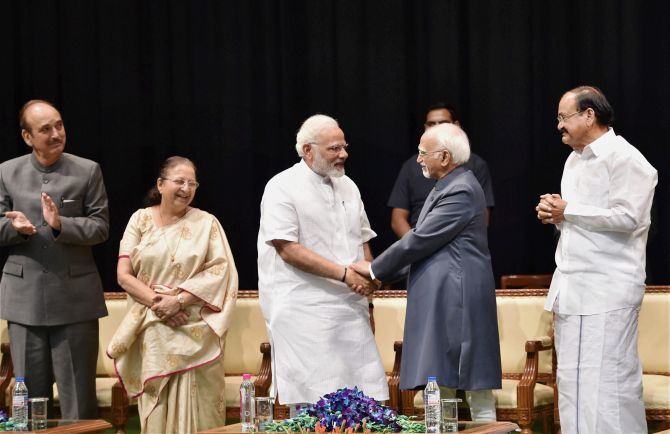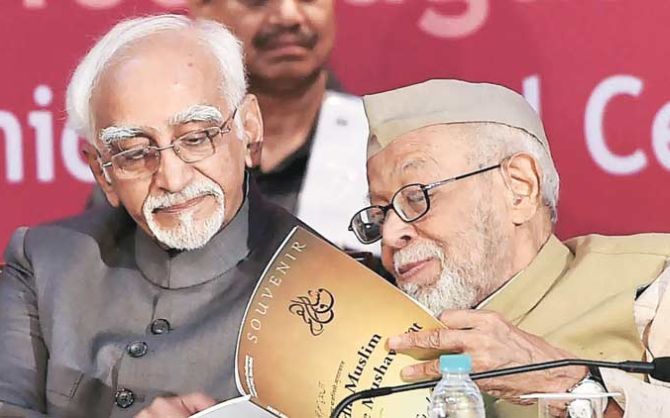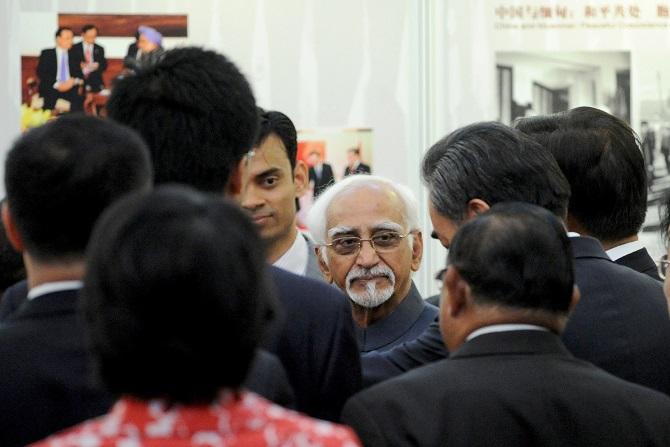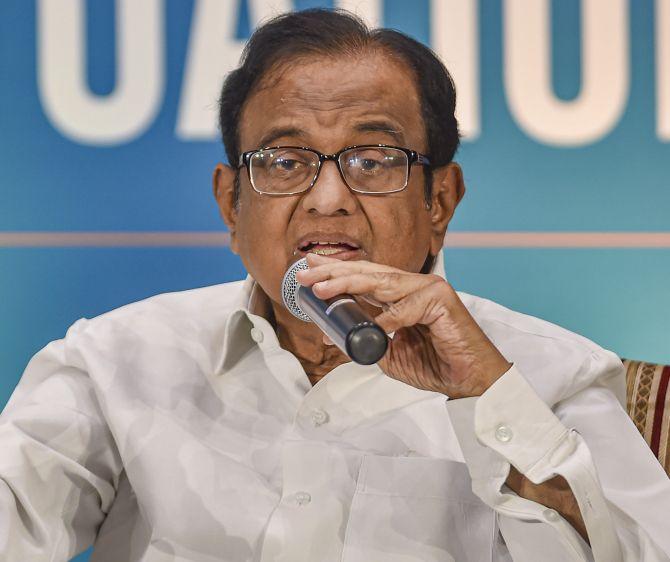At an online book release event, former vice president Hamid Ansari lays to rest the controversies surrounding his tenure.
An eclectic bunch of former diplomats, politicians and diplomat-turned-politicians huddled together virtually on Wednesday to wrestle with an important issue facing the Republic: Are Muslims being made invisible in a fast-changing society?
The occasion was the launch of former vice president Hamid Ansari’s memoir By Many a Happy Accident: Recollections of a Life.
As P Chidambaram, Dr Shashi Tharoor, both MPs, Pavan K Varma and Shyam Saran, both retired diplomats, indulged in a merry hour of thrust and parry, Rediff.com‘s Prasanna D Zore listened in on the illuminating conversation that covered the place of India’s Muslims in ‘New India’ and their rights as citizens of the Republic for the most part, but also lingered on Ansari as a diplomat, academic, his 10-year tenure as vice president, and the many controversies that dogged him.
Given that the discussion happened in virtual mode, the wine-and-dine ambience typical of Lutyens Delhi was missing, but the candid discussion cheerfully moderated by a yogic Rajdeep Sardesai ensured the evening ended on a high note.
The discussion mostly veered around the place of Indian Muslims in society and how they need to grapple with the challenges posed by a ‘New India’.
Hamid Ansari: ‘There is a concerted effort from certain quarters to regard Muslims as the OTHER’
“Is it somewhat getting difficult for your Muslim identity in some form or another not to get entangled in the politics of our times?” asked Sardesai in his trademark style of Ansari.
“This whole debate about Muslim identity or any identity, is somewhat superfluous because which one of us does not have multiple identities,” responded Ansari.
“It’s been my core belief that I carry many identities all at the same time, whether it’s membership of a club or an academic institution. So, why should just one identity be picked out, simply to be ridiculed?”
“A citizen is a citizen and his sub-identities are somewhat superfluous. There are specific concerns and they are articulated in the context of his being a citizen,” he continued, when Sardesai interjected citing specific instances from his book, like the controversy over his not saluting the Tricolour on Republic Day in January 2105, in the presence of Prime Minister Narendra Damodardas Modi, then president Pranab Mukherjee and then US president Barack Obama.
The other being the controversy stoked by the Bharatiya Janata Party’s Ram Madhav about Ansari skipping the Yoga Day event in June 2015.
“How did you respond when you were targeted?” Sardesai wanted to know.
“These exercises in targeting were rigged exercises. I know what protocol etiquette is (Ansari was chief of protocol for the Government of India from 1980-1985); people were somewhat ignorant to it.”
“Similarly, yoga is a private business; I do yoga every morning. Why should I go about parading it? I was not invited and I didn’t go to the function. There again, those who criticise me didn’t know what the stated protocol was, which is when the prime minister is the chief guest, the President and vice president are not invited,” Ansari informed the attendees.
“These are not serious controversies, they were ridiculous and those who ranted against me apologised (to me) one way or the other.”
On Sardesai’s citing Chidambaram’s observations that there were fewer and fewer Indian Muslims in public life that stand out, Ansari said, “There is a concerted effort from certain quarters to regard Muslims as the OTHER. All I say is, am I a citizen (of India) or not?”
“If I am a citizen, I have the right to be the beneficiary of all the things (rights and duties) that flow out of citizenship.”
“And to me, all my life the Preamble to the Constitution of India and its four principles — liberty, equality, fraternity, and above all and before these three, justice — sum up the entire discussion on what it should be like.”
“We live in a plural society. This was not created by the freedom movement. Plural society was an existential reality for centuries (in India).”
‘My professional competence mattered; not my faith’
“There was no mention of your tenure as the India’s ambassador to the United Nations. It is almost as if you are pigeonholed in a particular way to conform to a stereotype; it appears that it troubled and anguished you. Did it?” asked Sardesai.
“Let’s put the fact right,” began Ansari.
“There were two speeches that day by the prime minister. One was in the Rajya Sabha in the morning and the second one was at the Bal Yogi Auditorium at a function which was being hosted by Parliament, so to say, to say goodbye to me.”
“The second speech bore no resemblance to the first speech. Why was that so? I do not know. Both (the speeches) are on record; somebody can dig into it and find out why,” he responded.
“My experience as a diplomat for almost four decades did not talk about my Muslim-ness. When I was at the ramparts in Kabul, almost got blown up there, I was representing India in a very difficult situation or for that matter anywhere else in the world my Muslim-ness did not matter. My professional competence mattered. These things (postings) are not determined by faith.”
P Chidambaram: ‘The current dispensation is targeting the Muslim identity viciously’
Is a part of the Indian limb being severed? Is the idea of citizenship under threat?
“I don’t deny what Shri Ansari said. In fact, I think Shri Ansari is very discreetly and politely agreeing with me,” Chidambaram said when Sardesai asked him to respond to Ansari’s reply to his earlier remark that “a part of the Indian limb is being severed”.
“I am a resident of Delhi. I meet a number of people and somehow I am not meeting enough Muslims. Why? I am not making any effort to keep myself away (from Muslims) but I don’t find them,” Chidambaram stated.
“Are they being ostracised? Are they being excluded? Are they withdrawing from society? I can count the Muslim icons of Delhi on the fingers of one hand. Should that be so? There should be many, many more visible, active, speaking, writing (Muslims). I don’t find them,” Chidambaram emphasised.
“I think Shri Ansari is very discreetly and politely agreeing with me. He is as pained as I am; the developments of the last 15-20 years are threatening Muslims; they are withdrawing (because of these developments) or are being excluded (consciously by society that is being shaped by these developments).
“I agree that we have multiple identities — I as a Tamil, lawyer, politician — but these identities don’t exclude me or make me withdraw from society,” the former Union minister went on.
“I think the Muslim identity is deliberately targeted in India and the current dispensation is targeting it viciously,” Chidambaram concluded with his “strong statements”.
Pavan Varma: ‘The Hindutva right wing must be opposed in accordance with the yardstick of our civilisational legacy’
“Dr Ansari is someone who exemplifies the pride of being an Indian while also wearing his religious identity and is able to effortlessly merge the two,” said Rajdeep as he asked Varma to comment on the notion of Indian secularism.
Varma is indeed most qualified to answer the question; he has authored Krishna, The Playful Divine(1993), The Great Indian Middle Class (1998), The Book Of Krishna (2001), The New Indian Middle Class (2014), Adi Shankaracharya: Hindusims’s Greatest Thinker (2018), Chanakya’s View: Understanding India in Transition (2019).
“The problem is that pluralism or secularism is enshrined in the Constitution because we have been a nation which both by law and tradition, and particularly by the philosophical tradition of one of the foundational religions of this nation, which is Hinduism, believes in respect for all faiths,” Varma stated.
Now this essential, foundational substratum of belief was subsumed in the Constitution where citizenship was meant to overarch and transcend not merely faith but elevate your identity as an Indian,” Varma explained.
“There are people who have a problem with this and those people must be opposed not only by the Constitution but in accordance with the yardstick of our civilisational legacy. Being a Hindu, I say that with great pride. Therefore, because Mr Ansari was associated with West Asia, for instance, or studied in Aligarh Muslim University, or later became its vice chancellor, to believe that this association with sectoral concerns or institutions bearing a particular name will make him less of an Indian in terms of his composite outlook and his continued belief in pluralism, is a fallacy based on the obverse, the converse belief, which says that if you have been a (RSS) pracharak all your life, for instance, then you will be only committed to the Hindu cause primarily rather than respect for all faith within the all-embracing definition of Indian-ness.”
“Therefore, I ask Mr Ansari (referring to a “very significant paragraph in your book”) of the farewell speech to you when you were demitting office as vice president, the prime minister (Narendra Modi) seemed to allude to the fact that somehow you had an insularity based upon aspects of your experience which were an obstruction in a sense of your being a pluralist citizen of the republic of India, which guarantees pluralism by law,” said Varma, who shares his hometown, Ghazipur, with Ansari.
In lighter vein: ‘Are you blaming the prime minister?’
The discussions, though, were not all about diplomat-ese — there were a few lighter moments too in between the outpouring of words and phrases that diplomats often use to impress audiences.
Like when Sardesai remarked that diplomats are “relatively protected” than when they turn politicians, alluding to how Ansari remained untouched by controversies as a diplomat but faced a rough time as India’s vice president.
“Who said diplomats don’t face a tough time?” quipped former foreign secretary Shyam Saran.
The other time was when the flamboyant MP from Thiruvananthapuram, Dr Shashi Tharoor, who dropped in late, offered his explanation: “I was in Parliament where the prime minister arrived late. As soon as he spoke, I rushed out.”
“Are you blaming the prime minister?” quipped Varma, as everybody enjoyed a hearty laugh.
Shashi Tharoor: ‘I really hope that more Hamid Ansaris of the Muslim community will come out and chart a sensible, middle course’
“On the notion of being an Indian Muslim? On notions of secularism and composite culture, of which Dr Ansari is a classic example. Mr Chidambaram thinks that he belongs to a dying breed. That is becoming more and more difficult for Indian Muslims to get his place in Indian public life,” Sardesai probed Dr Tharoor for a response.
“I simply hope that it is not true but I think I agree with Chidambaram that politics in recent years has narrowed the space for a Hamid Ansari kind of figure,” said Dr Tharoor.
“As long as the dominant strain of our government is one which exhibits an ill-conceived bigotry towards the Muslim community, where the prime minister and his supporters make no effort to conceal their disdain for many of the aspects of Islam, Muslim culture, titles, words, language, etc, and who are much belligerent about it, as we saw in the aftermath of the Ram Janambhoomi verdict.”
“I would say that there is definitely going to be a challenge for Indian Muslims. I think there will be two countervailing pressure on younger Muslims.”
“There will be those who in reaction to this attitude of the ruling party feel obliged to become even more Muslim than they might otherwise have been; to advertise their piety, their religion, to anchor themselves in Islamic belief, and there will be those who will step backwards to advertise themselves as more pro-Hindu, open to Hindu aspects of life and belief, reconcile to the idea of a Hindu nation and I think that will divide the Muslim community,” said the erudite MP.
“I really hope that more Hamid Ansaris of the Muslim community will come out and chart a sensible, middle course.”
“The pressures that Shashi thinks will lead to such consequences (of Muslims getting divided), those pressures are not a monolith; they don’t represent Hindus as a bloc. And if there is a minority, which believes it has the ordained right to speak for Hindus, it does not. I can hold a dozen tutorials for them on what Hinduism really is,” Varma countered, bringing the curtain down on an hour of scintillating exchange.
Source: Read Full Article







